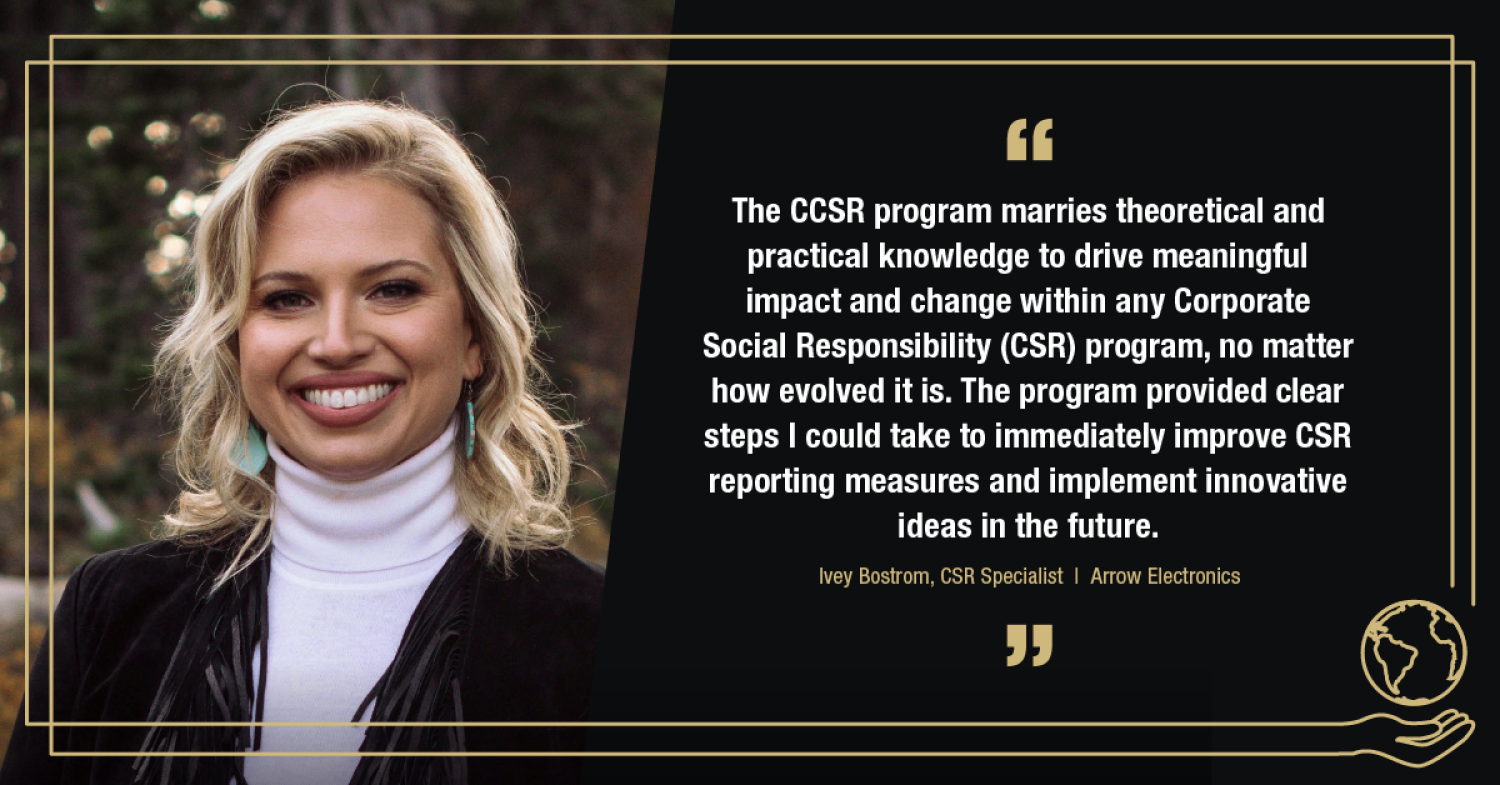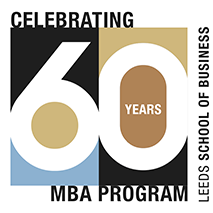CSR and ESG Job Opportunities are on the Rise: Certificate in Corporate Social Responsibility Gets Candidates Ready

The Certificate in Corporate Social Responsibility (CCSR) gave me the initial push to apply for a new ESG role at my company and CSR/ESG insight, in a hopeful, insightful and exciting atmosphere. Savannah Carroll (CCSR '21), moving from the IT Consulting branch of Deloitte over to the ESG Consulting team
There is increasing momentum in the business world to embrace impact and sustainability, resulting in the growth of jobs in corporate social responsibility (CSR) and Environmental, Social, Governance (ESG) management.
The demand for analysts, strategists and others knowledgeable about environmental, social and governance issues has never been higher — far more than the current supply of qualified humans.
Joel Makower, Inside the war for ESG talent, Greenbiz
CSR jobs are here to stay
Many factors contribute to the growing momentum in CSR. Current events, including COVID, climate change and the urgent need to address racial justice, have led to conversations about the role of business in society. Even businesses with CSR departments and which publish an annual CSR report, from Walmart to H&M, are recognizing they must play a more active role in addressing social problems and environmental threats.
At the same time, regulations and corporate pledges are creating a new operating environment with a greater focus on equity and inclusion, and on the linkages between climate change, governance issues, and corporate risk. In January, 2020 Goldman Sachs CEO, David Solomon, said Goldman would require all companies it helps go public to have at least one “diverse” board member. Shortly after that, in June of 2021, the Securities and Exchange Commission (SEC) redefined its scope to encompass ESG, climate, incentive-based compensation and shareholder democracy, among other issues.
The third major factor is consumer behavior. Whether as shoppers or employees, people are insisting that companies incorporate sustainability, CSR and DEI strategies throughout their business, and not just in their marketing campaigns.
For many companies, the idea that they can do well by doing good helped launch social and environmental programs, and they have used these to help build their brands. Today, companies are increasingly aware that there are financial risks to “greenwashing” or “impact washing” - from consumer boycotts to employee turnover to rising costs - and learning that they must do good if they want to do well.
There are more CSR and ESG jobs than qualified people
It feels like we have reached a tipping point around CSR. More and more companies are responding to the expectations of employees, customers, and investors that they take action on social and environmental issues. And they are hiring and/or promoting folks into CSR leadership roles to meet those expectations.
Pete Dignan, Adjunct Instructor, CCSR
There is a deep need for trained CSR professionals who can help shape strategy, know what data to collect and how to design systems to gather and analyze it, who understand how CSR touches each function of a business and who can make the case for why CSR programs matter ethically and as part of a corporate risk management plan.
CSR and ESG programs are growing across industries
In 2020, more than 90% of the largest 250 U.S. companies published a CSR report. This number has been steadily increasing over the past 15 years (64% reported on CSR in 2005).
The consultancy Price Waterhouse Cooper (PwC) announced an initiative to add 100,000 people in the next five years, including the launch of “trust leadership institutes” which will focus on training clients in ESG, a sign that they see this issue as central to all successful business in the future.
There is a lot of work to be done
The movement toward championing CSR is visible in the food and beverage industry, finance, consumer durable goods, and the tech industry where many companies are making public commitments to reducing their carbon footprint, addressing racial equity, and stopping climate change. At the same time, as Kenneth P. Pucker, a senior lecturer at the Fletcher School at Tufts University and former chief operating officer at Timberland shows in this article, even companies that have highly visible environmental and social impact initiatives are often not grappling with negative impacts in other parts of their supply chain and actively lobby against regulation.
CCSR prepares professionals to work CSR and ESG
The CCSR program has been supporting this movement and training professionals since 2016. Numerous alumni of CCSR have transitioned their roles within their companies to incorporate CSR responsibilities, launched CSR initiatives at work, and moved into new roles focused on CSR. Geri Mitchell-Brown, Co-Owner and Senior Director of Employee Experience & Social Impact at Namaste Solar, was one of the creators of CCSR. “When we co-designed the program our goal was to provide practical training and the opportunity to strengthen connections with people in the Denver/Boulder area who had CSR roles or interest. Five years ago, it was often a lonely position to be in CSR. It is a joy to see the program thriving today, responding to ever-increasing acceptance of CSR as a business imperative,” she says.
Cindy Santos (CCSR ‘20) recently took on the role of Senior Associate, Strategic Partnerships-Forum for Community Solutions at The Aspen Institute after spending four years working on social impact as National Partnerships Advisor at Casey Family Programs. “I appreciated learning about CSR as a business strategy and discussing how increasing diversity and building inclusive environments has the potential to spur innovation, increase equity, and build cohesion,” Cindy says when reflecting on her CCSR class.
Amber Ledgerwood (CCSR ‘29), also moved into a CSR role after taking CCSR. She spent just over three years as a Manager of Disaster Recovery and Humanitarian Aide at SES Networks, and ten months ago became their Senior Manager, Social and Environmental Impact. Amber believes that some day everyone in all companies will be thinking about purpose, and how their decisions are advancing the general good. For those who want to get started on their CSR journey today, there is CCSR.
To register, or learn more about the class including scheduling a time to chat with one of our Instructors, please visit us online.







